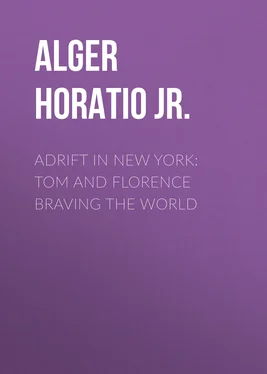Horatio Alger - Adrift in New York - Tom and Florence Braving the World
Здесь есть возможность читать онлайн «Horatio Alger - Adrift in New York - Tom and Florence Braving the World» — ознакомительный отрывок электронной книги совершенно бесплатно, а после прочтения отрывка купить полную версию. В некоторых случаях можно слушать аудио, скачать через торрент в формате fb2 и присутствует краткое содержание. Жанр: foreign_prose, literature_19, foreign_antique, на английском языке. Описание произведения, (предисловие) а так же отзывы посетителей доступны на портале библиотеки ЛибКат.
- Название:Adrift in New York: Tom and Florence Braving the World
- Автор:
- Жанр:
- Год:неизвестен
- ISBN:нет данных
- Рейтинг книги:4 / 5. Голосов: 1
-
Избранное:Добавить в избранное
- Отзывы:
-
Ваша оценка:
- 80
- 1
- 2
- 3
- 4
- 5
Adrift in New York: Tom and Florence Braving the World: краткое содержание, описание и аннотация
Предлагаем к чтению аннотацию, описание, краткое содержание или предисловие (зависит от того, что написал сам автор книги «Adrift in New York: Tom and Florence Braving the World»). Если вы не нашли необходимую информацию о книге — напишите в комментариях, мы постараемся отыскать её.
Adrift in New York: Tom and Florence Braving the World — читать онлайн ознакомительный отрывок
Ниже представлен текст книги, разбитый по страницам. Система сохранения места последней прочитанной страницы, позволяет с удобством читать онлайн бесплатно книгу «Adrift in New York: Tom and Florence Braving the World», без необходимости каждый раз заново искать на чём Вы остановились. Поставьте закладку, и сможете в любой момент перейти на страницу, на которой закончили чтение.
Интервал:
Закладка:
Jr. Horatio Alger
Adrift in New York: Tom and Florence Braving the World
CHAPTER I.
THE MISSING HEIR
“Uncle, you are not looking well to-night.”
“I’m not well, Florence. I sometimes doubt if I shall ever be any better.”
“Surely, uncle, you cannot mean–”
“Yes, my child, I have reason to believe that I am nearing the end.”
“I cannot bear to hear you speak so, uncle,” said Florence Linden, in irrepressible agitation. “You are not an old man. You are but fifty-four.”
“True, Florence, but it is not years only that make a man old. Two great sorrows have embittered my life. First, the death of my dearly beloved wife, and next, the loss of my boy, Harvey.”
“It is long since I have heard you refer to my cousin’s loss. I thought you had become reconciled—no, I do not mean that,—I thought your regret might be less poignant.”
“I have not permitted myself to speak of it, but I have never ceased to think of it day and night.”
John Linden paused sadly, then resumed:
“If he had died, I might, as you say, have become reconciled; but he was abducted at the age of four by a revengeful servant whom I had discharged from my employment. Heaven knows whether he is living or dead, but it is impressed upon my mind that he still lives, it may be in misery, it may be as a criminal, while I, his unhappy father, live on in luxury which I cannot enjoy, with no one to care for me–”
Florence Linden sank impulsively on her knees beside her uncle’s chair.
“Don’t say that, uncle,” she pleaded. “You know that I love you, Uncle John.”
“And I, too, uncle.”
There was a shade of jealousy in the voice of Curtis Waring as he entered the library through the open door, and approaching his uncle, pressed his hand.
He was a tall, dark-complexioned man, of perhaps thirty-five, with shifty, black eyes and thin lips, shaded by a dark mustache. It was not a face to trust.
Even when he smiled the expression of his face did not soften. Yet he could moderate his voice so as to express tenderness and sympathy.
He was the son of an elder sister of Mr. Linden, while Florence was the daughter of a younger brother.
Both were orphans, and both formed a part of Mr. Linden’s household, and owed everything to his bounty.
Curtis was supposed to be in some business downtown; but he received a liberal allowance from his uncle, and often drew upon him for outside assistance.
As he stood with his uncle’s hand in his, he was necessarily brought near Florence, who instinctively drew a little away, with a slight shudder indicating repugnance.
Slight as it was, Curtis detected it, and his face darkened.
John Linden looked from one to the other. “Yes,” he said, “I must not forget that I have a nephew and a niece. You are both dear to me, but no one can take the place of the boy I have lost.”
“But it is so long ago, uncle,” said Curtis. “It must be fourteen years.”
“It is fourteen years.”
“And the boy is long since dead!”
“No, no!” said John Linden, vehemently. “I do not, I will not, believe it. He still lives, and I live only in the hope of one day clasping him in my arms.”
“That is very improbable, uncle,” said Curtis, in a tone of annoyance. “There isn’t one chance in a hundred that my cousin still lives. The grave has closed over him long since. The sooner you make up your mind to accept the inevitable the better.”
The drawn features of the old man showed that the words had a depressing effect upon his mind, but Florence interrupted her cousin with an indignant protest.
“How can you speak so, Curtis?” she exclaimed. “Leave Uncle John the hope that he has so long cherished. I have a presentiment that Harvey still lives.”
John Linden’s face brightened up
“You, too, believe it possible, Florence?” he said, eagerly.
“Yes, uncle. I not only believe it possible, but probable. How old would Harvey be if he still lived?”
“Eighteen—nearly a year older than yourself.”
“How strange! I always think of him as a little boy.”
“And I, too, Florence. He rises before me in his little velvet suit, as he was when I last saw him, with his sweet, boyish face, in which his mother’s looks were reflected.”
“Yet, if still living,” interrupted Curtis, harshly, “he is a rough street boy, perchance serving his time at Blackwell’s Island, and, a hardened young ruffian, whom it would be bitter mortification to recognize as your son.”
“That’s the sorrowful part of it,” said his uncle, in a voice of anguish. “That is what I most dread.”
“Then, since even if he were living you would not care to recognize him, why not cease to think of him, or else regard him as dead?”
“Curtis Waring, have you no heart?” demanded Florence, indignantly.
“Indeed, Florence, you ought to know,” said Curtis, sinking his voice into softly modulated accents.
“I know nothing of it,” said Florence, coldly, rising from her recumbent position, and drawing aloof from Curtis.
“You know that the dearest wish of my heart is to find favor in your eyes. Uncle, you know my wish, and approve of it, do you not?”
“Yes, Curtis; you and Florence are equally dear to me, and it is my hope that you may be united. In that case, there will be no division of my fortune. It will be left to you jointly.”
“Believe me, sir,” said Curtis, with faltering voice, feigning an emotion which he did not feel, “believe me, that I fully appreciate your goodness. I am sure Florence joins with me–”
“Florence can speak for herself,” said his cousin, coldly. “My uncle needs no assurance from me. He is always kind, and I am always grateful.”
John Linden seemed absorbed in thought.
“I do not doubt your affection,” he said; “and I have shown it by making you my joint heirs in the event of your marriage; but it is only fair to say that my property goes to my boy, if he still lives.”
“But, sir,” protested Curtis, “is not that likely to create unnecessary trouble? It can never be known, and meanwhile–”
“You and Florence will hold the property in trust.”
“Have you so specified in your will?” asked Curtis.
“I have made two wills. Both are in yonder secretary. By the first the property is bequeathed to you and Florence. By the second and later, it goes to my lost boy in the event of his recovery. Of course, you and Florence are not forgotten, but the bulk of the property goes to Harvey.”
“I sincerely wish the boy might be restored to you,” said Curtis; but his tone belied his words. “Believe me, the loss of the property would affect me little, if you could be made happy by realizing your warmest desire; but, uncle, I think it only the part of a friend to point out to you, as I have already done, the baselessness of any such expectation.”
“It may be as you say, Curtis,” said his uncle, with a sigh. “If I were thoroughly convinced of it, I would destroy the later will, and leave my property absolutely to you and Florence.”
“No, uncle,” said Florence, impulsively, “make no change; let the will stand.”
Curtis, screened from his uncle’s view, darted a glance of bitter indignation at Florence.
“Is the girl mad?” he muttered to himself. “Must she forever balk me?”
“Let it be so for the present, then,” said Mr. Linden, wearily. “Curtis, will you ring the bell? I am tired, and shall retire to my couch early.”
“Let me help you, Uncle John,” said Florence, eagerly.
“It is too much for your strength, my child. I am growing more and more helpless.”
Читать дальшеИнтервал:
Закладка:
Похожие книги на «Adrift in New York: Tom and Florence Braving the World»
Представляем Вашему вниманию похожие книги на «Adrift in New York: Tom and Florence Braving the World» списком для выбора. Мы отобрали схожую по названию и смыслу литературу в надежде предоставить читателям больше вариантов отыскать новые, интересные, ещё непрочитанные произведения.
Обсуждение, отзывы о книге «Adrift in New York: Tom and Florence Braving the World» и просто собственные мнения читателей. Оставьте ваши комментарии, напишите, что Вы думаете о произведении, его смысле или главных героях. Укажите что конкретно понравилось, а что нет, и почему Вы так считаете.












